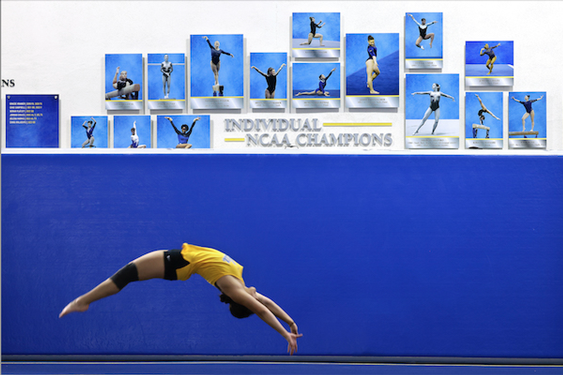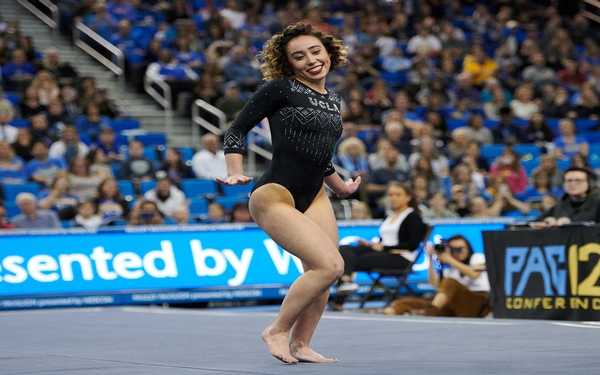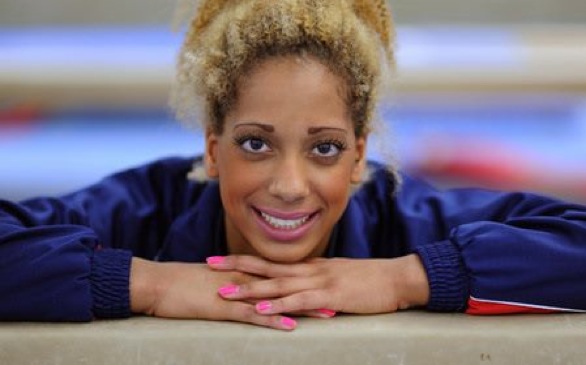At 7:20 a.m. sharp, Emma Malabuyo steps out of the elevator across from Pauley Pavilion. A poster of her dressed in a sparkly blue leotard faces the front door of UCLA's Acosta Training Center. It represents only one of the junior's goals on this campus.
Malabuyo is a star contributor for the Bruins, who are chasing their first appearance in the NCAA championship final since 2019. Toting a black backpack across campus, she is also a full-time student with aspirations of a career in sports broadcasting. A reminder of her latest dream is hanging around her neck — a gold necklace with a pendant of the Olympic rings.
While a goal as lofty as the Olympics often requires full dedication, Malabuyo is attempting an especially ambitious balancing act. Her road to Paris began Thursday in Cairo, where she will compete in the first of three World Cup meets with hopes of earning an Olympic berth while representing the Philippines.
The busy schedule has been overwhelming at points. She was worried professors wouldn't accommodate her travel schedule that will take her to Egypt, Germany and Azerbaijan in the span of four weeks. UCLA started its season with three consecutive road meets, fighting through the airport on a weekly basis between long training workouts. Some days, she can barely lift her arm above shoulder height after undergoing surgery during the summer.
But through the aches and pains, late nights and early mornings, the 21-year-old never stops smiling.
"Since I'm focused on so many different things and I'm enjoying them, it's helping me have more energy and fire for this dream," Malabuyo said.
Energy is the key ingredient for this Olympic hopeful. The Los Angeles Times recently shadowed Malabuyo during a day in her busy life.
7:20 a.m.: Treatment at Acosta center
The sun is still low on a bright morning when Malabuyo scans her fingerprint to enter Acosta Training Center, UCLA's primary athletic training facility. As she walks into the training room packed with massage tables, weights and treadmills, athletes from all UCLA sports are preparing for the day. She starts at a binder where she and her teammates log their sleep from every night. Only six hours. She was studying for a midterm.
Malabuyo sets up on a padded training table, waiting for the gymnastics team's trainer Tracy Sokoler to massage her shoulder and legs. Her shoulder is especially tight. It's been two days since she competed on bars, beam and floor at UCLA's dual meet against Washington on Jan. 27.
Malabuyo didn't used to have to do all this. When she started at UCLA, she could show up for practice 10 or 15 minutes early, warm up and get started. The one time she slept in recently, thinking she could get away without her 45-minute, pre-practice massage and activation routine of squats, lunches and resistance band exercises, she couldn't take any landings on her ailing knee.
"My body feels just so much older," Malabuyo said.
After more than a decade of training 36 hours a week with hopes of making the U.S. Olympic team, Malabuyo was happy to retire from elite gymnastics after being named an alternate for the Tokyo Olympics. The five-time U.S. national team member brushed off Filipino gymnastics officials when they first approached her about switching federations last year. She couldn't bear training at elite levels anymore, she thought.
"The expectations in America, you need to be up here no matter what," Malabuyo said, raising her hand to her eye level. "Your difficulty needs to be up here. You need to be like this. In the Philippines, we just appreciate you doing gymnastics for us."
With reassurance from the Filipino federation that she could perform her college-level routines, Malabuyo competed at the Asian Championships last summer after writing a letter to USA Gymnastics requesting an International Gymnastics Federation (FIG) nationality change. Representing her grandparents' home country, she won silver on floor, the highest placement ever for a Filipina gymnast at the Asian Championships.
Suddenly she started dreaming of the Olympics again.
8 a.m.: Practice at Yates Gym
A group of gymnasts crowd around a white board. Assistant coach Autumn Grable spells out the assignment. It's a light day.
Mondays in Yates Gym are often reserved for refining details with more drills than big skills. When Malabuyo jumps onto the beam for the warm-up, even the simplest cartwheel is garnished with a perfect finishing pose.
Malabuyo balances her collegiate routines — which are geared toward impeccable form instead of maximum difficulty — and her elite skills by working on her upgraded elements every other day. When she competes in the World Cup events, hoping to earn Olympic qualification on beam or floor, her routines will mostly stay the same. She will add difficulty on beam by changing her dismount and tweaking some combinations. On floor, she will add a triple wolf turn and get more difficulty on her leap series while competing her Paula Abdul routine from last season.
The routine changes weren't mandates from Filipino coaches. Instead, Malabuyo used her own understanding of the code of points to maximize her difficulty while constructing her routines. Instead of choreographers scripting every movement for her, Malabuyo sends different videos to national team coaches and judges for feedback. They trust her with her skills.
"I'm really enjoying this process and I'm taking ownership of my gymnastics," Malabuyo said. "I think that's a big piece that's very different than what I did before. … It's a partnership with my coaches and we're working together."
With Tokyo in mind, Malabuyo woke up at 5:50 a.m. three years ago. She got to the gym at 6:30 a.m. and practiced until noon. After going to the chiropractor and getting treatment or physical therapy, she returned at 4 p.m. for a second practice. Every day, she completed, at minimum, six full beam routines without wobbles.
Looking back, she admits she didn't enjoy it.
With the same lofty dream three years later, Malabuyo doesn't seem to carry the same weight. She manages her aching joints by completing two beam routines a day and working on mental visualization that has her feeling more confident in her gymnastics than ever. She gets to laugh with her teammates during practices. She cheers them on during meets.
She enjoys this.
"Doing all those extra things really contributes to my overall happiness and joy," Malabuyo said. "And when I'm feeling happy, I can do anything."
At the end of the three-hour practice, Malabuyo grabs her phone out of the organizer hanging on the wall and takes her jewelry out of her locker. She fastens chunky gold hoop earrings and clips on her gold Olympic necklace.
12:21 p.m.: Study break outside Powell Library
Malabuyo grabs her first meal of the day at 12:08 p.m. from inside the UCLA Athletics Hall of Fame, where there is a grab-and-go buffet for athletes. Sitting on a bench outside of Powell Library, she spreads a to-go container filled with steak, fish, asparagus, baked potato and pineapple across her lap. She only eats a few bites. She pulls a notebook out of her backpack and begins mumbling key words under her breath to prepare for her midterm in mass communication and sociology.
This quarter, Malabuyo is taking three classes, including a musicology course and a theater class, that all meet online. But exams are in person. Although she was a scholastic All-American last year, Malabuyo still gets more nervous for tests than any beam routine. She was home schooled since she was 11 and is used to taking tests alone.
Chasing the Olympics as a gymnast is often an isolating, all-consuming endeavor in the United States. Malabuyo quit public school when she moved from Milpitas to Texas in 2013. Her club coach Elisabeth Crandall-Howell was taking a collegiate job at California and recommended Malabuyo join Texas Dreams, one of the country's premiere elite gyms. Her parents and two siblings uprooted their lives for her to get a shot at the Olympics.
Before competing at the 2021 Olympic Trials, she broke down in tears. Malabuyo told her parents that it felt like the last 12 years of her life all came down to four minutes of competition.
She considered deferring school for a year to chase the Olympics again. Teammates Jordan Chiles (United States) and Ana Padurariu (Canada) already did so. But Malabuyo knew she didn't want to go on the road solo again. Although there is more on her plate, she's happy to carry it all.
"What's helping me go towards this dream is that there's a lot of flexibility in different things and different aspects of my life that just fills up my cup," Malabuyo said. "There's so many different things that I have instead of [being] focused on this one thing — one and only, it's the end-all, be-all. I'm not putting that pressure on myself. It's more of, just go out to these competitions, do what you can, do the best that you can do and go out there with no regrets."
To qualify for the Olympics, Malabuyo will compete on beam and floor in World Cup events in Cairo (Thursday through Sunday), Cottbus, Germany (Feb. 22-25), and Baku, Azerbaijan (March 7-10). Gymnasts accumulate points throughout the World Cup Series by finishing in the top 16 on each apparatus. Excluding gymnasts from countries that have already qualified for the Games, Malabuyo must finish the World Cup meets in the top two in the points standings on either apparatus to punch her ticket to Paris.
Malabuyo occasionally allows herself to imagine what it would be like to compete in the Olympics. She pictures traveling to Paris and entering the Olympic arena. She's not the only one dreaming big.
While Malabuyo is reviewing her notes a final time before her exam, Alex Peros, a former UCLA water polo player, walks by. Peros sits down next to Malabuyo and says she and her family already have tickets for the Paris Olympics. Peros raises her eyebrows. Malabuyo smiles.
"Hopefully," she says.
But first, this Olympic hopeful has a midterm.
©2024 Los Angeles Times. Visit latimes.com. Distributed by Tribune Content Agency, LLC.






